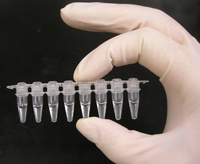
Photo from wikipedia
Molecular testing for hereditary cancers has rapidly advanced over the past two decades. Next‐generation sequencing has been widely adopted, which has made molecular testing increasingly accessible, and large gene panels… Click to show full abstract
Molecular testing for hereditary cancers has rapidly advanced over the past two decades. Next‐generation sequencing has been widely adopted, which has made molecular testing increasingly accessible, and large gene panels are now routinely used in clinical care. Effectively using molecular testing as a tool for the management of patients with hereditary cancer involves understanding various basic principles. In this article, we provide an overview of general principles for molecular germline testing for hereditary cancer syndromes. We overview hereditary cancer etiology, clinical indications for molecular testing, test methodologies and limitations, interpretation and reporting of test results, the evolving nature of evidence on gene‐disease relationships and penetrance, and resources related to the clinical management of hereditary cancer syndromes.
Journal Title: Genes
Year Published: 2022
Link to full text (if available)
Share on Social Media: Sign Up to like & get
recommendations!